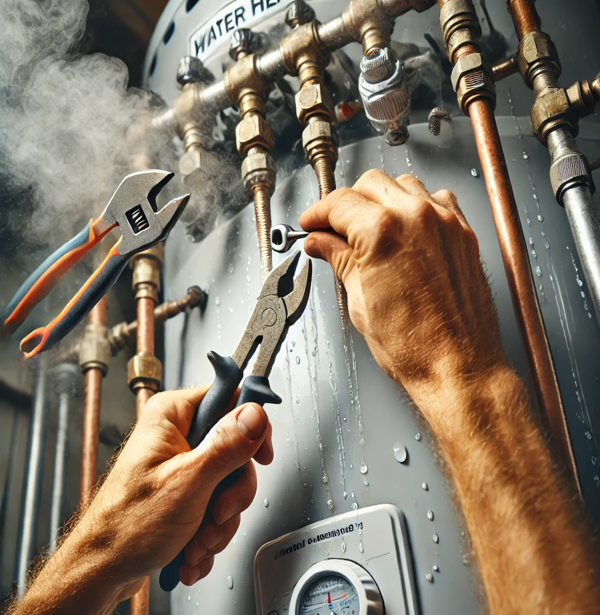
You rely on your water heater to provide comfort and efficiency in your home. When it malfunctions, they disrupt your routine and jeopardize daily tasks. Understanding repair essentials is the first step to a lasting solution.
Inspect your unit and heed hot water system warnings that signal impending issues. They offer clues to underlying problems that require attention. You must act promptly when problems arise to avoid complications and costly repairs.
You’ll discover that timely water heater repair minimizes downtime and prevents damage. They help you maintain energy efficiency, safety, and confidence in your home. Tackle repairs by understanding the key signs and taking swift action.
Discover essential signs that signal your water heater may be experiencing faults, ensuring you recognize potential issues before they become costly disasters.
Fluctuating water temperature often indicates a defective thermostat or failing heating elements that may require professional evaluation to avoid energy waste.
Rumbling, cracking, or popping sounds can be alarming, as they frequently result from sediment buildup inside your water heater and cause efficiency loss.
Rusty, cloudy, or unpleasant-smelling water is a sign that corrosion or bacterial growth is occurring within your heater and may lead to further damage.
Water pooling around the base of the heater suggests a leak, often caused by corroded parts or a malfunctioning pressure relief valve that requires urgent attention.
When you experience decreased pressure at faucets, sediment buildup is likely blocking critical water lines, reducing the efficiency of your appliance.
A water heater that has surpassed its 10–15 year lifespan often exhibits wear and tear, indicating that repairs or replacement might soon be needed.
This guide helps you decide if a repair can update your water heater or if a complete replacement is more beneficial for long-term reliability.
Before you decide, consider the following factors that measure repair benefits and replacement necessities to maintain a safe, efficient water heater:
Common issues with your water heater include insufficient hot water, peculiar noises, and leaks that disrupt daily routines and demand prompt attention.
Addressing these challenges early on is essential to maintain consistent performance while avoiding the unexpected interruptions of your household hot water supply.
Effective troubleshooting of water heater issues involves systematically checking components, ensuring safe power, and verifying proper functionality of all parts.
Begin by verifying the power source; a tripped circuit breaker or loose connection can prevent your heater from operating, and careful inspection is essential.
Examine both heating elements for signs of failure. A defective element causes rapid depletion of hot water, signaling the need for a professional replacement.
Make sure thermostats are correctly adjusted to around 120°F. Settings that are too high may cause overheating while damaging components over time.
By resetting the high-temperature limit switch, you prevent overheating. Always turn off the power before attempting this reset to ensure your safety.
Inspect all plumbing connections for looseness or leaks. Tightening inlet and outlet pipes often eliminates minor issues without requiring extensive repairs.
Following a routine maintenance schedule helps you avoid unexpected water heater failures while ensuring your unit works efficiently and safely.
Regularly check the pilot light, inspect vents for blockage, and verify that the area around your heater remains clear for safe access.
Each month, flush a pint of water from your tank to detect early sediment buildup, listen for unusual sounds, and inspect the insulation for damage.
Annually, clean the burner compartment, tighten electrical connections, and perform a full tank flush to remove persistent sediment that reduces efficiency.
Test the thermostat and pressure relief valve regularly, replace the anode rod when needed, and schedule professional inspections if you notice consistent issues.
Extending the life of your water heater involves mindful care, including regular maintenance, proper installation, and monitoring water quality to prevent premature wear.
Consider these reliable strategies to protect your investment and ensure your water heater remains efficient for many years to come:
Implementing these practices not only maximizes efficiency but also helps maintain a safe and uninterrupted hot water supply for your household.
Always be aware of persistent issues that indicate professional attention is necessary, preventing minor problems from evolving into major repairs that compromise safety.
If your water heater is over a decade old, has significant leaks, or produces unusual sounds, seeking professional help often saves you money and stress in the long term.
Regular inspections for rust, corrosion, or dents in your water heater are crucial. Visible damage commonly indicates internal issues requiring timely professional intervention.
Consistently testing the pressure relief valve ensures that your water heater remains safe under high-pressure conditions. Faulty valves can lead to dangerous malfunctions if ignored.
Maintaining a clean tank by draining and flushing out sediment prolongs your water heater’s efficiency. Periodic cleaning reduces mineral deposits and prevents future technical issues.
Your water heater troubles are simpler than they seem. With regular care and prompt fixes you can extend its service life, reduce unexpected costs, and maintain efficient performance. Trust expert advice and reliable practices. Explore additional insights at Dan’s Plumbing Guide for empowering home maintenance, ensuring reliable, worry-free comfort.
Spark Manufactured Homes Australia: A Smarter Growth Strategy for Developers & Builders
March 2, 2026SPARK KIT HOMES
March 2, 2026Building Beyond the Blueprint: A Smarter Approach to Modern Australian Homes
March 2, 2026How to Select the Ideal Water Pump Hose Size for Your Farming Requirements?
February 26, 2026A Homeowner’s Checklist: When To Call A Plumber In Seaford
February 26, 2026